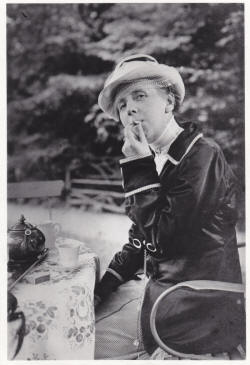

Queer Places:
Kanderner Str. 12, 79410 Badenweiler, Germany
Munich, Handelst. 1: Memorial plaque for Annette Kolb
Bogenhausener Friedhof
Bogenhausen, Stadtkreis München, Bavaria (Bayern), Germany
 Annette Kolb, real name Anna Mathilde Kolb, (February
3, 1870 - December 3, 1967) was
a German writer. She
worked sustainably for peace and earned credit for the german-French
understanding. In novels, she devoted herself capriciously to high-society
life. The majority of women in German-speaking Europe associated with
innovative arts and literature were married or engaged in significant
heterosexual relationships, although few had children. Some lived
unconventionally: Hannah Hoch was bisexual; painter
Elfriede Lohse-Wichtler
was married briefly, then lived highly unconventionally, including a period
with Gypsies and, reputedly, female partners. No well-known writer lived
openly as a lesbian. Gertrud Kolmar,
Annette Kolb,
Jeanne Mammen,
Milly
Steger, Lotte Laserstein, and
Nelly
Sachs never married.
Annette Kolb, real name Anna Mathilde Kolb, (February
3, 1870 - December 3, 1967) was
a German writer. She
worked sustainably for peace and earned credit for the german-French
understanding. In novels, she devoted herself capriciously to high-society
life. The majority of women in German-speaking Europe associated with
innovative arts and literature were married or engaged in significant
heterosexual relationships, although few had children. Some lived
unconventionally: Hannah Hoch was bisexual; painter
Elfriede Lohse-Wichtler
was married briefly, then lived highly unconventionally, including a period
with Gypsies and, reputedly, female partners. No well-known writer lived
openly as a lesbian. Gertrud Kolmar,
Annette Kolb,
Jeanne Mammen,
Milly
Steger, Lotte Laserstein, and
Nelly
Sachs never married.
Annette Kolb was born the third daughter of Munich garden architect Max Kolb and Parisian pianist Sophie Danvin, and german-French influences shaped her life and work. Her father Max Kolb was an illegitimate offspring of the Wittelsbacher. According to various traditions, either the future King Maximilian II or Duke Max Joseph in Bavaria was his father. In the first case, the father of Annette Kolb would have been a half-brother of Ludwig II, in the second case a half-brother of Empress Elisabeth of Austria. The maternal grandparents were Felix Danvin, a well-known French landscape painter, and Constance Amelie Danvin. Annette Kolb grew up in Munich and spent first school years in the monastery school Thurnfeld near Hall in Tyrol. She discovered her desire to write and published her first self-funded book in 1899. During World War I, she strongly advocated pacifism. A vehement plea for the application of reason and for a European understanding of the nations caused turmoil after a lecture in Dresden on 11 January 1915. In 1916, the Bavarian War Ministry imposed a letter and travel ban on her "because of pacifist activities". At the instigation of Walther Rathenau, Annette Kolb was able to go into exile in Switzerland. In 1923, the writer settled in Badenweiler, where the architects Paul Schmitthenner and Wilhelm Jost had built a house for her the previous year. In the 1920s she played an important role in German literary life. Rainer Maria Rilke was enthusiastic about her novels, and with René Schickele, whom she had known since 1914, her neighbour in Badenweiler, an Alsatian writer and advocate german-French balance of interests, she formed a friendship until his death in 1940. In 1929, the writer portrayed the French Prime Minister and Nobel Peace Prize laureate Aristide Briand in a book. Kolb attended meetings of the Cercle de Colpach in the 1920s, which Aline Mayrisch led in Luxembourg. Mayrisch wanted to initiate cultural encounters between Western Europeans and promote german-French relations as the core of a future peaceful, European unification.
In 1933 Annette Kolb emigrated to Paris and thus completely detached herself from the Germany of the National Socialists; they had publicly outlawed and burned her books. In 1936 she became a French citizen. In 1941, the 71-year-old fled to New York. After the war she lived until 1961 in Paris as well as in Munich and Badenweiler. She moved to Munich at the end of her life. Annette Kolb was literary, musical, journalistic and politically active until old age. Her grave is in the small Bogenhausen cemetery on Neuberghauser Straße in Munich (Grab Mauer on the right No. 10). The estate - 23 cassettes with correspondence and others - by Annette Kolb is located in the Monacensia[1]
My published books: